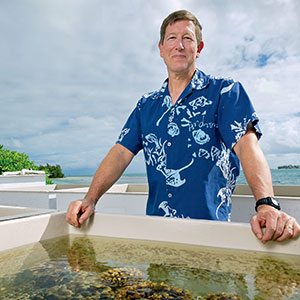
Christopher Sabine, University of Hawaiʻi at Mānoa interim vice provost for research and scholarship, is among the world’s top researchers working on Vision 2030, a United Nations initiative to address the challenges facing the world’s oceans.

As part of the initiative, 10 Ocean Decade Challenges were identified, and teams of subject matter experts drafted a strategic vision on how to meet each challenge by 2030. The outcomes were presented in Spain to more than 1,500 in-person participants and 3,000 online viewers from 124 countries in April at the 2024 Ocean Decade Conference.
“It was an honor to participate in such an ambitious initiative and to work with some of the best minds in the fields of oceanography and climate change to explore ocean-base solutions to climate change,” said Sabine. “One cannot fully address climate change without considering the ocean.”
Their finding emphasizes that global collaboration is needed to explore diverse pathways to harness ocean resources.
Sustainability challenges, strategies
Sabine was the lead author on Ocean Decade Challenge 5, which aims to achieve a more sustainable and climate-resilient ocean ecosystem. Success hinges on understanding climate-ocean interactions, addressing marine pollution, conserving biodiversity and ensuring sustainable food production. Strategies include advancing marine renewable energies, enhancing blue carbon ecosystems, and developing marine carbon dioxide removal technologies.
“The top finding from this working group was that a global ocean strategy that all countries support is needed,” said Sabine, who is also a UH oceanography professor. “As an island state where the ocean has such cultural and economic significance as well as our vulnerability to climate change, it is essential that Hawaiʻi be involved in helping to set global policy when it comes to considering ocean-based solutions to climate change.”
The publication focuses on collaborative efforts among international scientists, ocean industry stakeholders and policy experts. Its goal was to assess the current understanding of oceans’ role in climate dynamics, identify knowledge gaps, and propose actionable steps to bridge these gaps effectively.
The document provides recommendations for enhancing ocean literacy, improving governance, and enhancing predictive capabilities for climate and oceanic forecasting.
“This was an international team of scientists, ocean industry, and policy people working together to assess the current status of our understanding of the role of the oceans in climate change, think about where our gaps are in understanding, and how to make meaningful progress in closing those gaps to most effectively find ocean-based solutions to climate change,” said Sabine.

